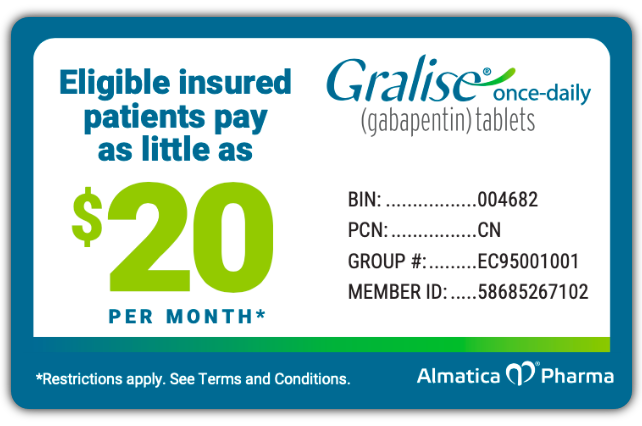Important Safety Information
Do not take GRALISE if you are allergic to gabapentin or any of the ingredients in GRALISE.
Do not change your dose or stop taking GRALISE without talking with your healthcare provider. If you stop taking GRALISE suddenly, you may experience side effects. Talk with your healthcare provider about how to stop GRALISE slowly.
Like other antiepileptic drugs, gabapentin, the active ingredient in GRALISE, may cause suicidal thoughts or actions in a very small number of people, about 1 in 500. This can happen while you take GRALISE or after stopping. However, it is not known if GRALISE is safe and effective in people with seizure problems (epilepsy). Therefore, GRALISE should not be used in place of other gabapentin products.
Call a healthcare provider right away if you have any of these symptoms, especially if they are new, worse, or worry you:
- thoughts about suicide or dying
- attempts to commit suicide
- serious breathing problems
- new or worse depression
- new or worse anxiety
- feeling agitated or restless
- panic attacks
- trouble sleeping (insomnia)
- new or worse irritability
- acting aggressive, being angry, or violent
- acting on dangerous impulses
- an extreme increase in activity and talking (mania)
- other unusual changes in behavior or mood
Serious breathing problems
- Serious breathing problems can occur when GRALISE is taken with other medicines that can cause severe sleepiness or decreased awareness, or when it is taken by someone who already has breathing problems. Watch for increased sleepiness or decreased breathing when starting GRALISE or when the dose is increased. Get help right away if breathing problems occur.
Before taking GRALISE, tell your healthcare provider if you:
- have or have had depression, mood problems or suicidal thoughts or behavior
- have breathing problems
- have seizures
- have kidney problems or get kidney dialysis
- are pregnant or plan to become pregnant. Tell your healthcare provider right away if you become pregnant while taking GRALISE.
- are breastfeeding or plan to breastfeed. GRALISE can pass into your breast milk.
Tell your healthcare provider about all the medicines you take including prescription and non-prescription medicines, vitamins or herbal supplements. Especially tell your healthcare provider if you take any opioid pain medicine (such as oxycodone), or medicines for anxiety (such as lorazepam) or insomnia (such as zolpidem). You may have a higher chance for dizziness, sleepiness, or serious breathing problems if these medicines are taken with GRALISE.
Taking GRALISE with certain other medicines can cause side effects or affect how well they work. Do not start or stop other medicines without talking to your healthcare provider.
Do not drink alcohol or take other medicines that make you sleepy or dizzy while taking GRALISE without first talking to your healthcare provider. Taking GRALISE with alcohol or medicines that cause sleepiness or dizziness may make your sleepiness or dizziness worse.
Do not operate heavy machines or do other dangerous activities until you know how GRALISE affects you. GRALISE can slow your thinking and motor skills.
The most common side effect of GRALISE is dizziness. Tell your healthcare provider about any side effect that bothers you or that does not go away. This is not the only possible side effect of GRALISE. For more information, ask your healthcare provider or pharmacist. Call your doctor for medical advice about side effects. You are encouraged to report negative side effects of prescription drugs to the FDA. Visit www.fda.gov/medwatch or call 1-800-FDA-1088.
Indications and Usage
GRALISE® (gabapentin) is a prescription medicine used in adults, 18 years and older, to treat pain from damaged nerves (neuropathic pain) that follows healing of shingles (a painful rash that comes after a herpes zoster infection).
It is not known if GRALISE is safe and effective in children under 18 years of age with postherpetic pain.
Please see the full Prescribing Information, including Medication Guide.



